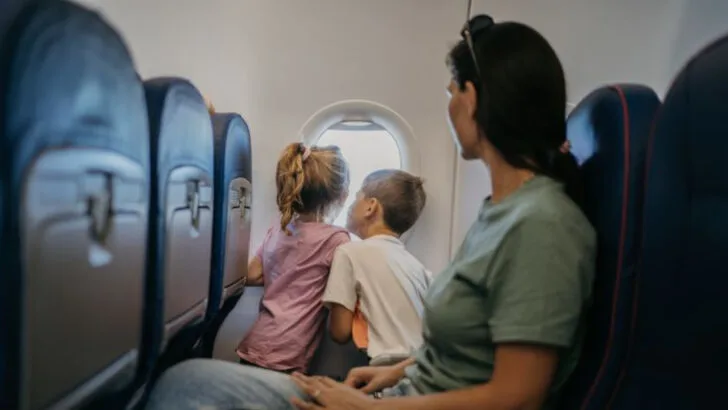Navigating the social intricacies of air travel can be challenging, especially when it comes to seat swapping requests.
In this guide, we will explore ten effective strategies to gracefully decline a seat swap on a plane without feeling guilty or causing discomfort.
Whether you value your carefully chosen seat or have specific reasons for staying put, these tips will equip you with the confidence to say no politely and assertively.
Know Your Why
Before you say “no,” be clear with yourself on why you want to stay put. Whether it’s an aisle seat for easy bathroom access or a window view to avoid motion sickness, having a reason helps you stand firm if someone asks for a switch.
When your reasoning is solid, you’ll find it easier to assert your decision without second-guessing yourself. This clarity fosters confidence, making your polite refusal both genuine and steadfast.
Understanding your priorities can transform a potentially awkward moment into a simple, straightforward interaction.
Be Direct, Not Defensive
A calm “I’d prefer to keep my seat, thanks” goes a long way. You don’t owe a lengthy explanation. A firm but polite answer shuts down any potential guilt-tripping before it starts.
By being straightforward, you convey your message clearly and effectively, minimizing misunderstandings. This approach promotes respect and understanding, leaving both parties feeling dignified.
Directness, paired with politeness, asserts your decision without unnecessary confrontation. Clarity and brevity are your allies in maintaining a peaceful, respectful travel environment.
Avoid Over-Apologizing
You’re not the villain here. Saying sorry too much opens the door for pushback. A brief, kind decline works better than an overly apologetic one.
Over-apologizing can imply weakness or uncertainty, which might encourage persistent requests. By maintaining a balanced approach, you show respect for both yourself and the requester.
This balance allows you to reject the swap gracefully, without compromising your comfort or boundaries. Remember, your travel comfort is just as important as anyone else’s.
Read the Request (and the Requester)
There’s a big difference between someone wanting to sit with a child vs. just angling for a better seat. Gauge the situation. If it’s a genuine family separation, you can still say no—just be extra courteous.
Understanding the context of the request allows for a more empathetic response. This discernment ensures that your refusal remains respectful and considerate, even when you decide to stick to your original seat.
Empathy, paired with assertiveness, creates a harmonious travel experience for everyone involved.
Have a Go-To Phrase Ready
“I planned ahead for this seat, so I’m going to stay here” = gold. Having a simple phrase in your back pocket keeps you cool in the moment and helps you avoid rambling or hesitating.
A rehearsed response not only saves you from the stress of improvisation but also ensures your message is clear and concise.
This preparedness fosters confidence and helps communicate your decision with ease and grace. A well-chosen phrase can be your best ally in maintaining your travel comfort.
Lean on Logic if Pressed
Explain that you booked early, paid extra, or need specific seating for health or comfort reasons. This shifts the conversation from “won’t” to “can’t,” which is easier for most people to accept.
Logical reasoning provides a solid foundation for your decision, making it less likely to be challenged. By sharing these rationales, you frame your refusal as a necessity rather than a choice.
This method not only justifies your decision but also fosters understanding and respect from the requester.
Don’t Let Public Pressure Sway You
Sometimes the asker will try to get others involved (or loud enough to make a scene). Stay calm. Flight attendants can help if it escalates—but most of the time, a firm no ends it.
Remaining composed under pressure is key to maintaining your resolve. Public persuasion can be daunting, but standing your ground asserts your autonomy.
By handling the situation with poise, you affirm your decision without provoking further conflict. Trust in your right to enjoy the seat you chose.
Respectful Tone > Perfect Words
How you say it matters more than what you say. Even if your response isn’t perfect, a steady tone and respectful body language speak volumes.
Tone conveys intent, ensuring your message is received as intended. By focusing on respect and kindness, you mitigate tension and promote understanding. Effective communication transcends words, relying on the sincerity of your delivery.
This approach fosters mutual respect and eases potential discomfort, making the interaction smoother for both parties.
Know When to Consider It
Sometimes the trade might actually be worth it—legroom, empty row, earlier deplaning. You’re allowed to decline, but also allowed to accept if the new seat benefits you too.
It’s not rude either way. Evaluating the pros and cons allows you to make an informed decision that prioritizes your comfort. Flexibility in your choice underscores your autonomy, ensuring your travel experience aligns with your needs.
Recognizing potential benefits helps you navigate these requests with clarity and confidence.
Remember: Boundaries Are Not Rude
Saying no doesn’t make you selfish—it makes you clear. You’re not responsible for someone else’s travel choices. You’re responsible for your own comfort.
Establishing boundaries affirms your self-worth and respects your personal space. By valuing your needs, you maintain control over your travel experience.
Confidence in setting boundaries not only protects your comfort but also fosters an environment of mutual respect. Remember, your seat is your choice, and honoring that is perfectly acceptable.

